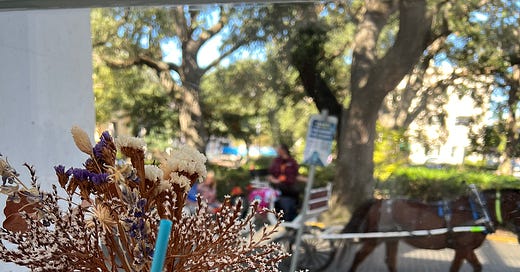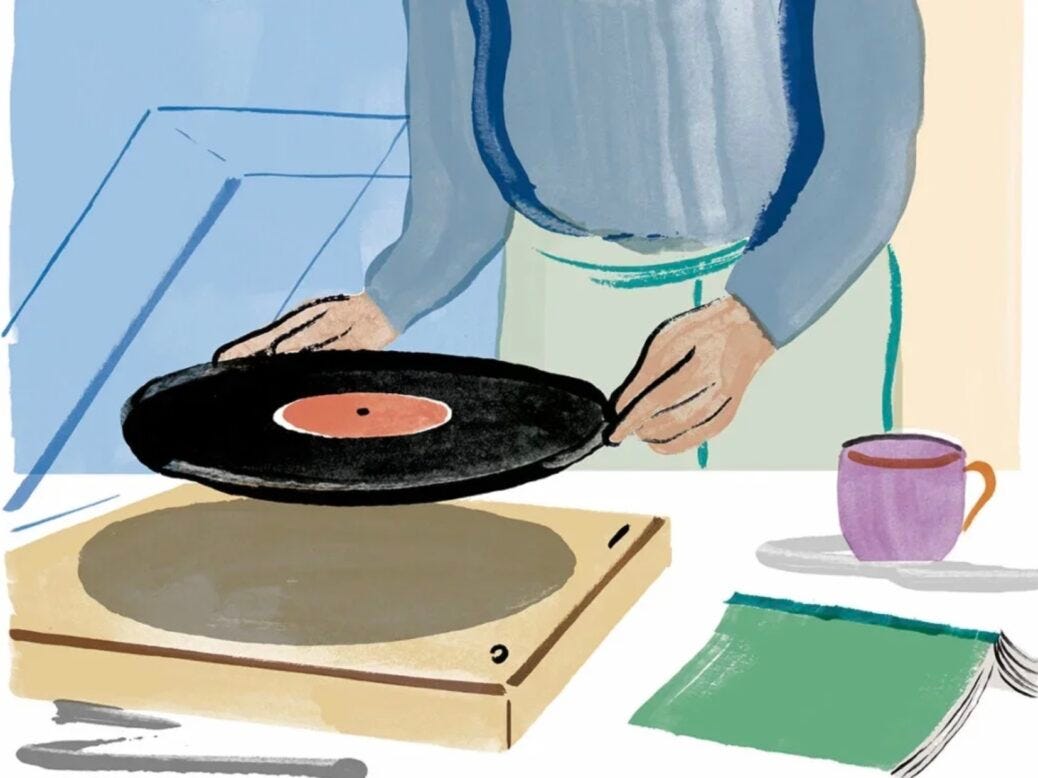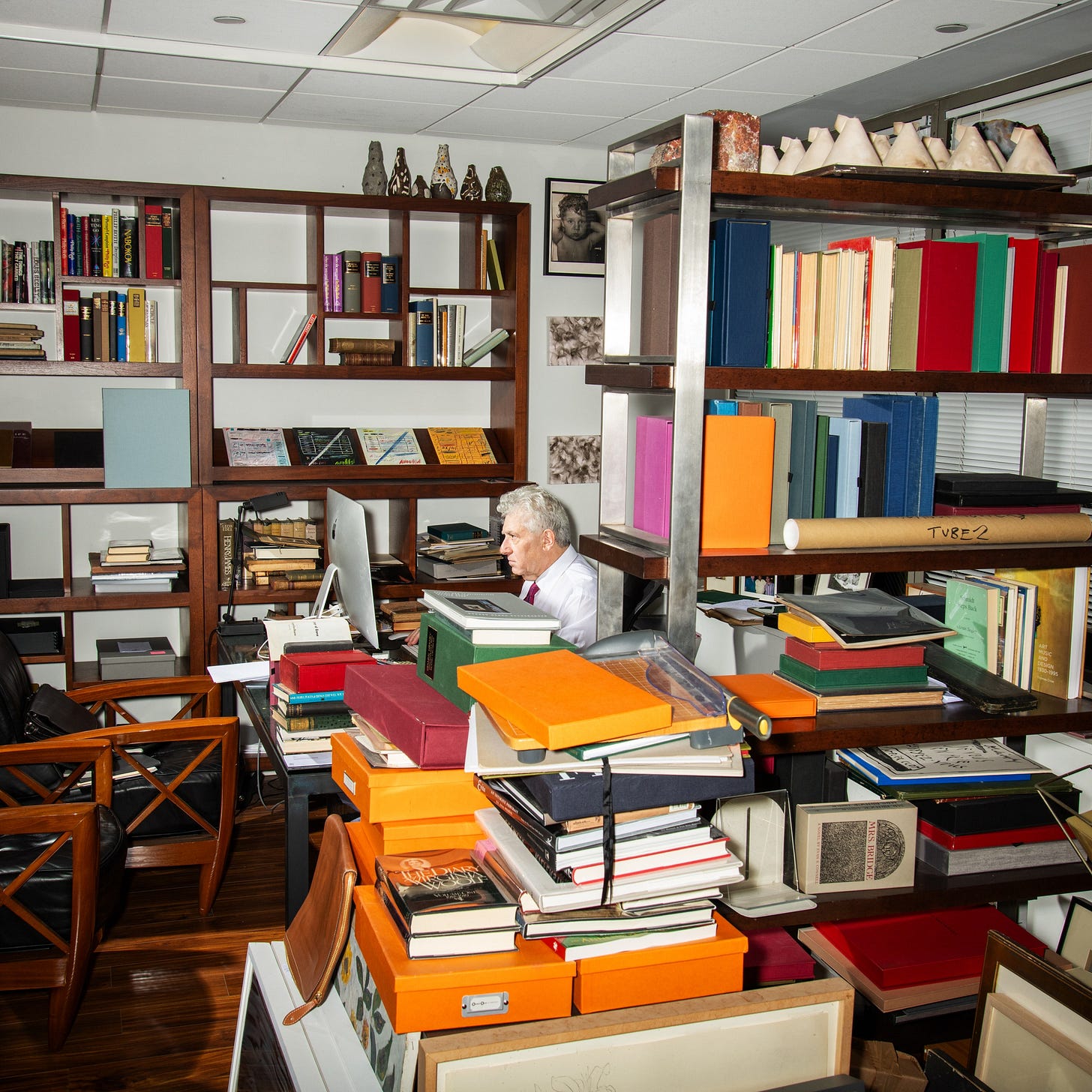The Bluestocking 341: Rare books and minor talents
I was touching the hand that touched the hand that touched the Hand
Happy Friday!
And hello from Savannah, Georgia. My colleague John had told me it was one of his favourite cities in the U.S., and I can see why—a compact historic centre, arranged around 14 squares; a beautiful riverside with pelicans; a pedestrianised zone (gasp) with street cafes and bars; oak trees draped with Spanish moss; incredible restaurants and some lovely small museums.
I spent last Sunday walking the streets in—and here I apologise to British readers—a T-shirt. Yes, it’s mid-20s and blue skies. If you want somewhere with Florida’s weather, but without mad people fighting alligators on the street, try Savannah!
In the Telfer art museum, I paused for an Arnold Palmer (lemonade and iced tea) in tribute to the late golfer’s massive endowment.
The main stories this week are both about genius, in different ways—which is another way of saying that I have to go work on the latest draft of my book. Until next time,
Helen
PS. The first episode of STRONG MESSAGE HERE, with me and Armando Iannucci talking about political nicknames, went out yesterday.
We Can’t All Be Geniuses (New Statesman)
Maybe the overuse of the word reveals an anxiety on the part of critics. Ann Powers wryly notes that it was the men who were at such pains to pin the label on [Joni] Mitchell, so perhaps it’s a determination to be an arbiter of taste that makes them say, “If I like this artist, they must be a genius otherwise why would I like them?” I think we should be more sparing with the word, or it won’t mean anything.
I find myself wondering what it does mean. I’ve just watched the film One Hand Clapping in which Paul McCartney and Wings perform songs from the Band on the Run era, and I came out believing very strongly in Paul McCartney as a genius.
I felt I had seen the music flowing through him, almost as though he doesn’t know where it’s coming from; that sense that he is a channel as much as a creator; that he is somehow without a filter. He can seem goofy and uncool when he’s talking, but perhaps it is that very openness, that unselfconsciousness, which allows the music through. Perhaps that is genius.
*
Tracey Thorn reflects on the pleasure of being (or experiencing) a minor talent.
A Controversial Rare-Book Dealer Tries to Rewrite His Own Ending (New Yorker)
Book Row, around Manhattan’s Fourth Avenue, once contained forty-eight rare- and used-book stores, complete with standoffish cats; now only the Strand remains. The Internet destabilized both supply and demand. Before, collectors had to wait for a mimeographed mail-order catalogue to learn whether a long-sought copy of “Sons and Lovers” had turned up. Prices were based on condition, the fame of the work, and the scarcity of the copy on sale—a scale delineated, in order of increasing expense, by such descriptors as significant, pivotal, seminal, stunning, very rare, exceedingly rare, and extremely rare. The Internet made scarcity scarce: everyone could see that there were a gazillion copies of the 1911 Encyclopaedia Britannica for sale online, and their price plunged. To sell, a book now had to be the best copy, the cheapest copy, or the only copy.
The business, at the top end, angled away from condition and toward singularity, toward “association copies”: books owned by or signed by the author or by someone instrumental to their contents. A well-preserved first edition of “For Whom the Bell Tolls” might sell for $1,000. That same copy might go for $10,000 if Hemingway had signed it; $20,000 if he’d inscribed it to someone he knew; $50,000 if he’d inscribed it to Dorothy Parker; or $300,000 if he’d movingly inscribed it to one of his wives. Such books required dealers to know more and to be more imaginative: they had to articulate what made a particular provenance or inscription so valuable. Christiaan Jonkers said, “Our job as booksellers is to justify the difference between the price we bought it at and the price we’re selling it at by providing a narrative about why you should buy it.”
The bookseller’s narrative is often one of proximity to inspiration, a tangible point of contact with genius. This idea is implicit in the prizing of first editions—especially first editions with a personal connection to the source. The novelist Reynolds Price said of his treasured copy of “Paradise Lost,” which was originally owned by John Milton’s daughter, “It was like the apostolic succession. I was touching the hand that touched the hand that touched the Hand.”
*
This story, about a rare-book dealer charged with nefarious dealings is also a great introduction to the steamy, secretive world of rare book dealing, full of sharks and ingenues and people with more money than sense, and other people pretending to be lofty aesthetes when they’re actually tooth-jacking mercenaries.
It also covers something I’ve been thinking about a lot in relation to genius. Namely, that nothing produced by AI will ever be acclaimed as a work of genius—no matter how tight its rhyme schemes or beautiful its colour palette or whatever—because we definitionally want genius to be human. We want to see the paintings that Vincent Van Gogh did. We want to read the words that Milton wrote (if not touch the pages he touched). We want to know how long it took Michelangelo to paint the Sistine Chapel, even though Midjourney could spit out 15 acres of butch saints in about three minutes flat.
Oh, and here’s an insight into what I think of as the genius-making industry: the archivists and curators and scholars and disciples who make or break reputations. Libraries and museums no longer want to shell out millions for the papers of dead white males—the staple of the genius canon until now: “‘The material being collected is different now,’ Susan Benne, the executive director of the A.B.A.A., told me. ‘It used to be about ‘high spots’—the pivotal works in literature, science, medicine, and philosophy, what’s called ‘the mind of man.’ Now it’s also about topics such as women’s history, the Underground Railroad, L.G.B.T.Q.+, and sexual history.’”
Quick Links
“My standard joke about my job is that I am less a ‘writer’ than I am a ‘textual YouTuber for Gen Xers and Elder Millennials who hate watching videos.’” Same. (Max Read, Substack)
“Of course, none of this is relevant if writing per se is only an ancillary goal. [Taylor] Lorenz told me, ‘I don’t want to be a full-time writer. I want to be an Internet personality’.” Literally the opposite, girl (New Yorker, £)
I wrote about seeing a crowd at a Trump rally boo Rachel Levine, and what it means for America that the Democrats have boxed themselves into a series of positions of gender that they can’t or won’t defend in an election campaign (The Atlantic, gift link).
See you next time—if you would like to email me, just hit reply. And if you were forwarded this email and would like to subscribe, hit the button below:







Your solution to the gender cult-de-sac (see what I did there?) the Harris campaign finds itself in is both elegant and straightforward. In fact, the almost exact same formulation was promoted energetically by the Progressive Conservative Party of New Brunswick during the recent election there. They lost, badly. With mitigating factors.
Then again, I live in what Julie Bindel repeatedly refers to as Tranada. Trump’s campaign only convinces Canada’s federally funded journalistic elites that they must be right about a topic they refuse to tackle in any substantive manner. You won’t find many Helen Joyces or Kathleen Stocks here. The one true feminist TRA dissenter got red-pilled years ago; she then moved to Mexico.
Movement on this one issue would cement a win in the Electoral College for Harris even after sacrificing a couple of points in the popular vote.
Their reluctance is staggeringly dumb.
As always, the gift article is happily received.
Cheers.
There's something very refreshing about Helen's writing.
Always lucid, sharp, original, funny and kind of edgy.